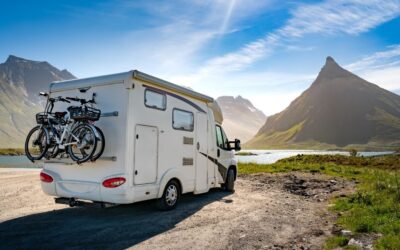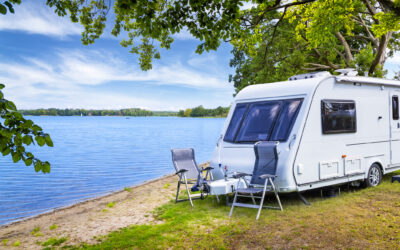5 things to help your insurance claim in the event of an accident in your motorhome or touring caravan

Nobody likes to think about being involved in an accident while they’re out enjoying the freedom of the road in their motorhome, caravan or campervan. But we all know accidents can – and do – happen. And if you’re unlucky enough to be involved in one, the last thing you want is more trauma and upset when it comes to making an insurance claim.
We’ve put together a list of 5 things you can do in the event of an accident that will help your insurance claim run as smoothly as possible…
Safety first
If you find yourself in an accident while on the road in your motorhome or caravan, the first thing to do, after checking everyone is OK, is to move to a place of safety. If you’re travelling on smaller roads, this might mean moving away from your vehicle and taking refuge in a nearby field, or somewhere safe where you can be easily seen by other vehicles. If you’re travelling on the motorway or a bigger road, this will most likely mean getting as far away from the road – and your car – as possible, while still being able to see it – so up a grassy embankment or similar.
Once everyone’s safe, it’s time to start prepping for your insurance claim.
-
Swap details with other drivers
If you’re in an accident that involves other vehicles, you’re legally obliged to collect the details of all other drivers and vehicles involved. It’s really important at this point to try and stay calm and polite, and to never apportion or accept blame, or apologise for the accident. Keep it simple, get the details you need, and leave it at that.
The details you’ll need to collect are:
- Full names and contact details of all other drivers involved
- Full details of the vehicles involved, including make, model, colour and registration number
- Full insurance policy details of all other parties, including policy number and type
- Details of the vehicle owner, if they aren’t the person who was driving the car
- Information about any passengers travelling in the other vehicles, including their ages
If a foreign lorry is involved in the accident, you’ll need to make a note of the numbers on both the lorry and the trailer, as these are often different.
-
Take pictures of all vehicles involved
In the immediate aftermath of an accident, shock and adrenaline can make it difficult for us to remember all the important details about who was there, what happened, and even how many people were involved. In that case, photographs are a great way of recording the details, and can be useful for jogging your memory later on. Most of us have mobile phones with cameras these days, so it couldn’t be easier to grab all the necessary images. You’ll want to make sure you’ve got pictures of:
- The entire scene, getting as much of it in one photo as possible
- The positions of the vehicles involved
- Each vehicle, close up, including your own
- Any and all damage to each of the vehicles involved
- The condition of the road – any potholes, mud, spillages, puddles
- The driving conditions, including the weather and lighting
- Any roadworks or obstructions
-
Gather details about witnesses
In most cases, anyone who witnesses an accident up-close will stop. Primarily this will be to check everybody is OK and to see if they can help, but they may also be invaluable when it comes to making your insurance claim. If you spot any witnesses at the scene, it’s a good idea to ask them for:
- Their name and contact details, including address and telephone number
- A description of what they saw, and their understanding of what happened – this can be useful in proving who was at fault in an accident, which will ultimately affect your claim
-
Collect and preserve dashcam footage
If you have a dashcam fitted to your vehicle, make sure you preserve the footage from the time of the accident and keep it stored somewhere safe. This will not only help support your version of events and your insurance claim, it could be vital to any police investigation into the accident.
It may also be worth asking witnesses and the other drivers if they have a dashcam fitted, and to ask them to make sure their footage from the time of the accident is secure.
You could also do a visual scan of the area for any CCTV cameras that might be mounted on nearby buildings or warehouses. Make a note of any you spot, so you can pass these details on to the police and your insurer to support your claim.
-
Get a police case file number
If the accident you were involved in was attended by the police, or if you called them to report a crime because the accident was a hit-and-run, your insurer may ask you to provide the case file information. They will want to see the police report at a later date, but you should be issued with a crime number or case number when reporting the accident, which you can pass on to your insurer.
When to contact your insurer
It’s always best to notify your insurer that you’ve been in an accident as soon as possible after it’s occurred. In fact, it wouldn’t be too soon to let them know while you’re still at the scene. As long as you’ve gathered all the information mentioned above, you’ll have a strong basis for making a claim, and you’ll have covered all the angles should there be a question or dispute about whose fault the accident was.
Your accident claim, all wrapped up
Here at Wrapper, we want to make it as quick and easy as possible for you to make a claim and get back on the road to the adventures you love. If you’ve been involved in an accident in your motorhome, caravan or campervan, simply log in to your portal and we’ll start processing it straight away.
Recent Posts
- Pop the Champagne! Wrapper Insure wins at Insurance Times awards December 17, 2022
- On the road again: Preparing your motorhome or caravan for the season ahead December 2, 2022
- 5 things to do if your motorhome or caravan is stolen November 14, 2022




